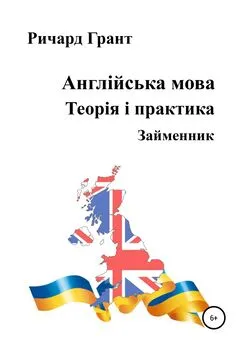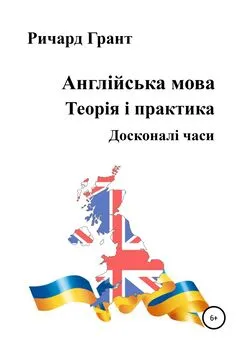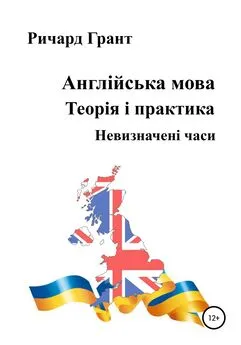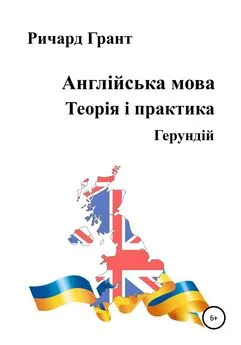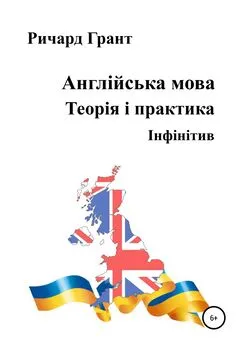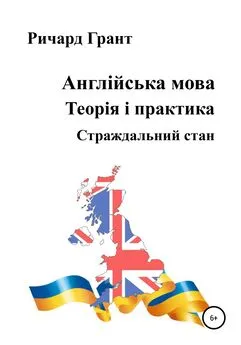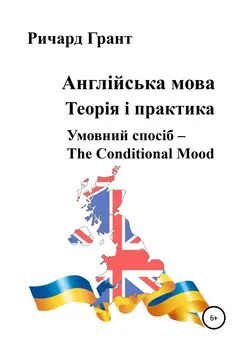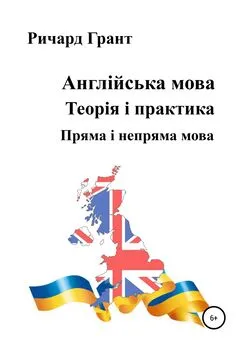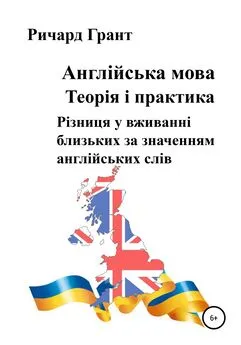Ричард Грант - Англійська мова. Теорія і практика. Займенник
- Название:Англійська мова. Теорія і практика. Займенник
- Автор:
- Жанр:
- Издательство:неизвестно
- Год:2022
- ISBN:978-5-532-94828-0
- Рейтинг:
- Избранное:Добавить в избранное
-
Отзывы:
-
Ваша оценка:
Ричард Грант - Англійська мова. Теорія і практика. Займенник краткое содержание
Англійська мова. Теорія і практика. Займенник - читать онлайн бесплатно ознакомительный отрывок
Интервал:
Закладка:
Вправа 21
Дайте відповідь на питання, маючи на увазі, що всю роботу люди зробили самостійно.
Who bought that book for him? – He bought it himself.
1. Who cooked your breakfast this morning? 2. Who helped them to translate the text? 3. Who helped the little girl to dress? 4. Who helped you to find the way? 5. Who cleaned your classroom? 6. Who washes your clothes? 7. Who broke his tape-recorder? 8. Who built their house? 9. Who helped her to do maths? 10. Who planted the garden in front of your house?
Вправа 22
Заповніть пропуски зворотними займенниками, де це необхідно.
1. All our friends enjoyed … at his birthday party. 2. I often speak to … when I'm in bad mood and alone. 3. Polly and Nancy, help … to sweets and juice. 4. Concentrate … if you don't want to fail your exam. 5. They haven't decided yet where they'd meet …. 6. Little Polly is only two but she can dress …. 7. She got up, washed … and left the house without disturbing anyone. 8. I'm not angry with him. I'm angry with …. 9. Relax … when you dance. 10. They never think about other people. They only think about …. 11. Who went with her? – Nobody. She went by …. 12. Let's hide … under that tree. The rain is so heavy. 13. He feels … not well today. 14. Don't take him to the party. He'll spoil everything …. 15. We didn't know who that young guy was. He didn't introduce …. 16. It's windy, you may catch cold …. 17. Children, take the towel and dry ….
Взаємні займенники
Взаємні займенники описують взаємини між двома або більше особами або, рідше, предметами.
До взаємних займенників відносяться займенники:
each other– один одного
one another– один іншого
За правилами традиційної граматики займенник each other може бути застосовано тільки до двох осіб, а one another використовується відносно більш двох осіб.
Однак на практиці це правило часто нехтують. Обидва займенники змінюються тільки за вiдмiнком (each other’s, one another’s).
We think of each other as of a good, interesting opponent. – Ми ставимося один до одного, як до доброго, цікавого суперника.
My hamsters keep stealing one another’s food. – Мої хом'яки вічно крадуть один у одного їжу.
Відповідний прийменник ставиться перед словами each або one:
We live too far from each other. – Ми живемо дуже далеко один від одного.
They are such good friends they will do anything for each other. – Вони такі хороші друзі, що один для одного що завгодно зроблять.
Вправа 23
Знайдіть помилки в деяких реченнях і виправте їх.
1. John and Mary looked at each other. I would say he looked at her with admiration. 2. Peter and Susan have met each other. 3. Elka, Yvonne and Joanna gave each other a book. 4. Three children talked to each other. They stood next to my house. 5. My uncle and I talk to each other every day. Although his character isn't easy to bear. 6. She and her brother stopped talking and looked at each other. 7. John and his mother bought each other presents for Christmas. 8. My cat and his dog looked at each other with dread. 9. Barbara's three sons and their father hate each other. 10. I think that all people should love each other. No matter where they live.
Питальні займенники
Питальні займенники – використовуються для побудови спеціальних питань.
Вони позначають невідомі запитувачу особи або предмети, які повинні бути названі у відповіді на питання.
До питальних належать такі займенники:
who – який, хто
whoever – хто б не, який би не
what – що, який
whatever – що б не, (хоч) що-небудь
which – який, хто, який
whichever – який завгодно, хоч би який
whose – чий, чия
Вживання питальних займенників
З усіх питальних займенників тільки who змінюється за відмінками і має форму об'єктного відмінка whom, проте в розмовній мові її використання необов'язково.
Whom did you invite for your birthday? – Кого ти запросив на день народження?
Займенник which, на відміну від what, передбачає вибір між обмеженим набiром осіб або предметів:
I’d paint my room in blue or yellow. Which of the colours do you like more? – Я б пофарбувала свою кімнату синім або жовтим кольором. Який із цих (двох) кольорiв тобі подобається більше?
I have no idea what colour to use in my room. What colours do you like? – Поняття не маю, в який колір пофарбувати свою кімнату. Які кольори (будь-які) тобі подобаються?
Займенники whoever, whichever і whatever в питаннях передають здивування або обурення:
Whatever is this thing on the floor? – Що це таке на підлозі?
Вправа 24
Поставте необхідний питальний займенник.
1. How … students are in the class right now? 2. … are you planning to leave? 3. … is that person next to you? 4. … are you writing a letter to? 5. … do you do for living? 6. … is the reason for your visit? We haven’t seen each other for a while. 7. … this book belong to? 8. … are you going after graduation? 9. … do you expect to be in five years? 10. … color do you prefer most? 11. … did you meet at the conference? 12. … pattern do you like? Both dresses look great. 13. … is your brother going to do with his job? 14. … did you go for the holiday? – We went to Spain. 15. … is responsible for guest accommodation in your hotel?
Вправа 25
Виберіть правильний варіант відповіді.
1. The coach, ( which/who) was appointed just last week, made no comment on the situation. 2. Isn’t that the street ( which/where) the accident happened last night? 3. The human brain, ( which/what) weighs about 1400 grams, is ten times the size of a baboon’s. 4. There are several reasons ( where/why) I don’t want to talk to Mike. 5. This is the university ( which/where) I work. 6. The new guy in our group ( who/whose) name is Alex, seems really nice. 7. All the friends to ( who/whom) the e-mail was sent replied. 8. February 14th ( where/when) we express our love to each other, is known as St. Valentine’s Day. 9. A very popular breed of dog is the German Shepherd ( what/which) is often used as a guard dog. 10. The unsinkable Titanic sank on its maiden voyage, ( what/which) shocked the whole world.
Відносні займенники
Відносні займенники – пов'язують підрядне речення з головним, при цьому вони відрізняються від сполучникiв тим, що є членами підрядного речення:
I know the lecturer who will make today’s report. ( who служить підметом пiдрядного речення.) – Я знаю лектора, який сьогодні буде робити доповідь.
До відносних займенників належать:
who – який, хто
whose – чий, чия
which – який, хто
that – той, та, то
Займенник who позначає людей:
This is the engineer who has designed the new engine. – Ось той інженер, який створив новий двигун.
Займенник whose відображає приналежність живим предметам:
Do you remember the man whose car was stolen yesterday? – Пам'ятаєш людину, чию машину вчора викрали?
Займенник which (який, якого) відноситься до неживих предметів:
He showed me the museum which was founded 400 years ago. – Він показав мені музей, який був заснований 400 років тому.
Займенник that може ставитися і до живих, і до неживих предметів:
The musician that won the award is Italian. – Музикант, який виграв премію – італієць.
I like the book that I bought yesterday. – Мені подобається книга, яку я прочитав вчора.
Вправа 26
Поставте необхідний відносний займенник who, whose, which або that.
1. That is the shop … was awarded as the best shop in the city. 2. He didn’t follow the instructions … he was given, so he failed to pass the test. 3. The girl … brother goes with me to the gym is a good singer. 4. The girl … lived next door was very shy and couldn’t say a word to protect herself at school. 5. The man … broke into our house was caught in two days. 6. I need to buy a laptop … can work up to 5 hours without a charger. 7. She visits her grandmother … lives in the countryside every summer. 8. My father … is a doctor has no idea how to repair a car. 9. She was wearing a dress … looked like princess’. 10. The photo … is placed on the mantel was taken at the picnic two years ago. 11. The bookshelf … we bought last week has broken down. 12. The man … was sitting on the bench turned around and saw his granddaughter. 13. A woman … son was crying paid no attention to him. 14. The woman … car had broken down on her way home spent 3 hours waiting for help. 15. My best friend … I know for years will never let me down.
Читать дальшеИнтервал:
Закладка:
